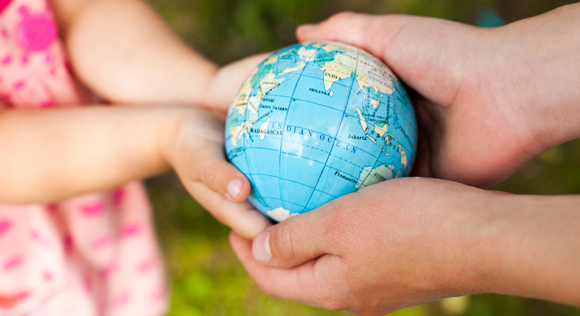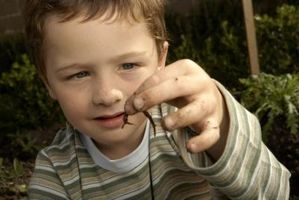 Dinner can be the secure base from which children explore the wider world. Food lies at the center of a living web that connects us both as global citizens who all have to eat to live, and as stewards of the planet who need to share the limited and precious natural resources to grow our food. At dinner we can talk about these connections, and talk can lead to action.
Dinner can be the secure base from which children explore the wider world. Food lies at the center of a living web that connects us both as global citizens who all have to eat to live, and as stewards of the planet who need to share the limited and precious natural resources to grow our food. At dinner we can talk about these connections, and talk can lead to action.
Let’s start with what to talk about. It’s shocking to learn the extent of our food waste: 40% of US-produced food, (to the tune of $165 billion each year), never gets eaten—it’s tossed away on over-portioned plates at home; it rots in refrigerators when we buy too much food; it gets thrown out by supermarkets when non-regulated expiration dates dictate that perfectly good food is over the hill; and it is disposed of on farms, if fruits and vegetables are imperfect in size or shape.
 This colossal amount of waste has economic, environmental and moral consequences. For starters, you could save a lot of money by buying only what you need, only cooking what you’ll eat, and using leftovers. Wasted food for a family of four is estimated to account for more than $2000 a year. Then there is the environmental cost of all this waste since the toxic gas, methane, is given off when food scraps decompose in landfills and accounts for 25% of methane emissions. If food wastage were a country, it would rank third in greenhouse gas emissions after China and the United States.
This colossal amount of waste has economic, environmental and moral consequences. For starters, you could save a lot of money by buying only what you need, only cooking what you’ll eat, and using leftovers. Wasted food for a family of four is estimated to account for more than $2000 a year. Then there is the environmental cost of all this waste since the toxic gas, methane, is given off when food scraps decompose in landfills and accounts for 25% of methane emissions. If food wastage were a country, it would rank third in greenhouse gas emissions after China and the United States.
With one in six Americans lacking a secure supply of food, the wasting of perfectly good food also becomes a moral issue. If waste were cut by even 15%, the food saved could feed more than 25 million Americans every year. The Pope recently lent his voice to this issue on World Environment Day when he said, “Throwing away food is like stealing from the table of those who are poor and hungry.”
Many organizations have sprung up to redistribute excess food from restaurants, college cafeterias, and supermarkets by bringing it to shelters and soup kitchens. Some states, like California, Arizona, Oregon, and Colorado, have passed bills allowing growers to receive a tax donation when they give excess produce to food banks. Certain corporations are beginning to alter their production practices to cut down on wasted food. There is much to be done.
What YOU Can Do
Every day, you and your family can make a difference in cutting down on food waste right in your own kitchen. Here are a few easy ideas:
- Store poultry and fish on the lower, cooler shelves in the refrigerator so they last longer.
- Freeze unused ingredients, like eggs and bread, rather than waiting for them to rot.
- Buy imperfect vegetables and try to eat lower on the food chain, at least a few nights a week.
- With help from your kids, you can compost, turning waste into gold!
How to Compost
Composting is a cheap, natural way to get something from nothing; in a few months your discarded garbage is transformed into a nutrient-rich food for your garden. Composting at home for a year can save global-warming gasses equivalent to what your washing machine produces in three months.
Composting is an easy job to assign to a child because it’s basically just dumping food scraps into a pile, where they will rot and turn into wonderful fertilizer while reducing your flow of garbage. To begin, you can make or purchase a plastic or wooden bin (often subsidized by your local government, because they want to divert materials from their waste stream). Toss together grass clippings and shredded leaves in alternating layers if they are available. Otherwise, just get started with whatever food scraps you have on hand—egg shells, tea bags, coffee grinds, potato peels, discarded pumpkins, watermelon rinds, tough broccoli stalks, and anything else. Best to leave out fish bones or meat since those could attract a party of skunks and raccoons making whoopee in your backyard.
The compost pile also needs oxygen and water. So, using a shovel or a pitchfork, lift everything and turn it around at least once a month, or whenever you think of it. This will aerate the mess, bringing different materials into contact with one another (which helps the rotting process). You should also water your compost pile or collect rainwater and use that to keep it moist, but not soggy.
 If you really want to go all-in, you can buy bags full of compost starters– bugs and worms — but your own worms will eventually make their way to your compost, where they’ll eat it and excrete the aftereffects.
If you really want to go all-in, you can buy bags full of compost starters– bugs and worms — but your own worms will eventually make their way to your compost, where they’ll eat it and excrete the aftereffects.
It’s a bit mysterious how long it takes the composting process to transform your garbage into rich fertilizer, but you’ll know it’s ready to spread on vegetable and flowerbeds when the stuff at the bottom of the bin is textured, blacker than regular soil, and when you can’t recognize the disparate parts. My husband, a veteran composter, says, “It’s kind of criminal not to do it.”
There’s even a poem by Shel Silverstein to inspire a reluctant composter—“Sarah Cynthia Sylvia Stout would not take the garbage out,” which regales us with the pile-up of food waste and the dire circumstances that ensue:
Prune pit, peach pit, orange peel
Gloopy-glumps of cold oatmeal,
Pizza crusts and withered greens,
Soggy beans and tangerines
At last the garbage reached so high
That finally it touched the sky
And all the neighbors moved away,
And none of her friends would come to play
Footnotes:
- https://www.nrdc.org/food/files/wasted-food-ip.pdf
- https://www.nrdc.org/food/wasted-food.asp
- https://www.fao.org
- https://worldnews.nbcnews.com/_news/2013/06/05/18780415-wasting-food-is-like-stealing-from-the-poor-says-pope? lite
- https://www.foodrecoverynetwork.org/; https://www.thinkeatsave.org/; https://www.feeding5k.org/gleaning.php
- https://england.lovefoodhatewaste.com/content/food-waste-recycling-what-do-food-you-cant-eat
